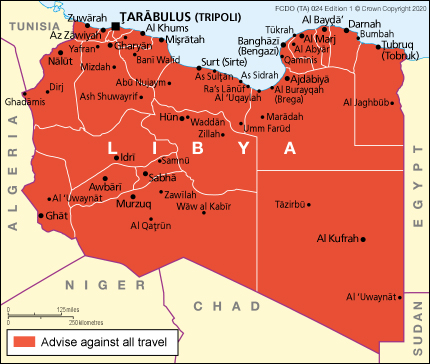Libya
Warnings and insurance

Your travel insurance could be invalidated if you travel against advice from the Foreign, Commonwealth & Development Office (FCDO).
FCDO advises against all travel to Libya
FCDO has advised against all travel to Libya since 2014. The local security situation is fragile and can quickly deteriorate, with intense fighting starting without warning. Any travel to, from or within Libya is at your own risk. If you are a British national in Libya, we strongly advise you to consider leaving.
UK government support
UK government support is severely limited in Libya. The British Embassy in Tripoli does not provide support to British people who need help. If you are in Libya and need urgent help from the UK government (for example, if you’ve been attacked, arrested or someone has died) contact the British Embassy in Tunis, Tunisia, on +216 71 108 700 or contact us online.
Travel insurance
If you choose to travel, research your destinations and get appropriate travel insurance. Insurance should cover your itinerary, planned activities and expenses in an emergency.
About FCDO travel advice
FCDO provides advice about risks of travel to help British nationals make informed decisions. Find out more about FCDO travel advice.
Follow and contact FCDO travel on Twitter, Facebook and Instagram. You can also sign up to get email notifications when this travel advice is updated.